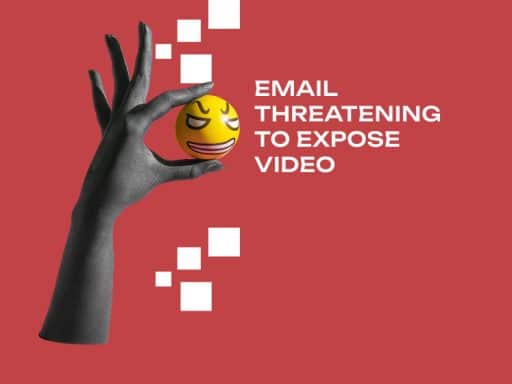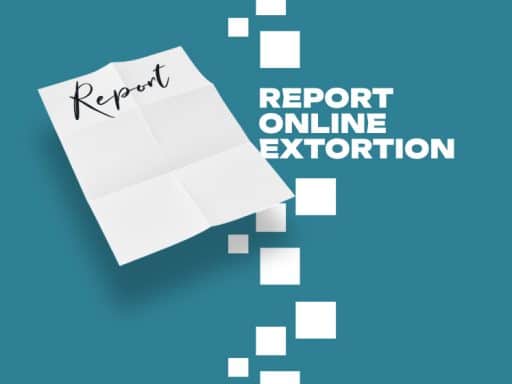Opening a blackmail email can make your heart drop to your stomach. This feeling of fear is justified, but you shouldn’t be afraid to report the issue. There are resources out there that will work to help you, and you should let them. Read on to learn who you should report blackmail emails to, what information to include, and additional resources that can help.
What to Do When You Receive a Threatening Email
Preparing for blackmail is sort of like conducting weather emergency drills. It’s a lot of effort to prepare for an incident that may never actually occur, right? Well, these events do happen – and in the case of blackmail emails – much more frequently than people think.
In 2024, the FBI reported $143,185,736 in total losses to online blackmail, nearly doubling the figure from the prior year. These scams can happen to anyone, but nobody should face them alone. Instead, proceed with the following course of action.
Stay Calm
We understand that a blackmail email can make you feel like your world is crumbling around you. We don’t want to belittle the level of distress you’re going through. However, you need to try to remain level-headed and respond rationally.
Don’t Pay the Blackmailer
Giving in to your blackmailer’s demands is highly unlikely to solve your problem and often perpetuates the threats and demands. A study conducted by Digital Forensics Corp. earlier this year found that when victims paid their blackmailer, roughly 40% were met with daily threats. Of those, over two-thirds received multiple threats per day.
Cease Communication and Gather Evidence
You may feel the urge to delete the blackmail email immediately. You may even consider sending back a fiery response. However, neither of these reactions will help – and could actually make things far worse.
Instead, halt all communication with the blackmailer. Collect all evidence from your exchange, including email addresses, header data, and any threatening messages included. If you think it could be useful to the investigation, document it.
Who Should You Report Email Blackmail To?
- The Police: You can go to your local station, call them over the phone, or visit their website to file a police report. You should start locally to rule out nearby suspects and work your way up.
- National Law Enforcement: If the perpetrator isn’t local, you’ll need to move forward with your national investigation agency. In the United States, the FBI’s IC3 task force handles reports of online crime.
- Cybersecurity Professionals: Law enforcement receives an influx of reports daily. It’s just not possible for them to follow every lead. Furthermore, your main priority is likely to stop the blackmailer’s threats and remove their leverage. This is where online security experts like the team at DFC can help.
How Digital Forensics Corp. Can Help You Combat Scammer Emails
You need evidence that someone sent you a threatening email to report them, and DFC knows how to find it. While this may be your first experience with an online criminal, we handle situations like this every day. We’ve helped thousands of people recover from email blackmail, and we’d be honored to add your case to that list.
Uncovering Identities
Remember how we said earlier that you should document email headers? Well, that’s because they contain metadata that we can analyze to determine the true sender of the email, their IP address, geolocation, and even the device they were using.
Taking Over Communication
Based on what we learn from our free consultation, we can seamlessly step into place for you and communicate on your behalf. Our experience has given us proprietary knowledge of how these scammers think, allowing us to calculate their next move before they make it.
Sensitive Data Recovery and Release Prevention
Through device imaging and reconstruction, we can recover your sensitive data. Moreover, we can work to leverage our knowledge of the blackmailer’s true identity with the goal of facilitating the full deletion of your data from their devices.
Ongoing Protection
With DFC, your service doesn’t end when your blackmailer is identified, and your information is removed from their grasp. We can provide ongoing monitoring and security system audits to help you beef up your defense and prevent similar instances in the future.
Looking Forward: How to Stay Safe from Blackmail Emails in an Evolving World
As technology continues to march forward at an exponential pace, blackmailers develop new techniques to capitalize on unsuspecting targets. You need to constantly build upon your foundational internet safety knowledge.
DFC has a large library of educational material that you can access for free on our website. Visit our home page, click the ‘About Us’ dropdown tab, and click ‘Blog’ to access this information and stay up to date on the latest trends in online crime.
And if you receive a blackmail email and need help recovering data and reporting the issue, DFC is here. Call our Blackmail Helpline for a complimentary, confidential conversation with one of our specialists and CC us to your battle.






